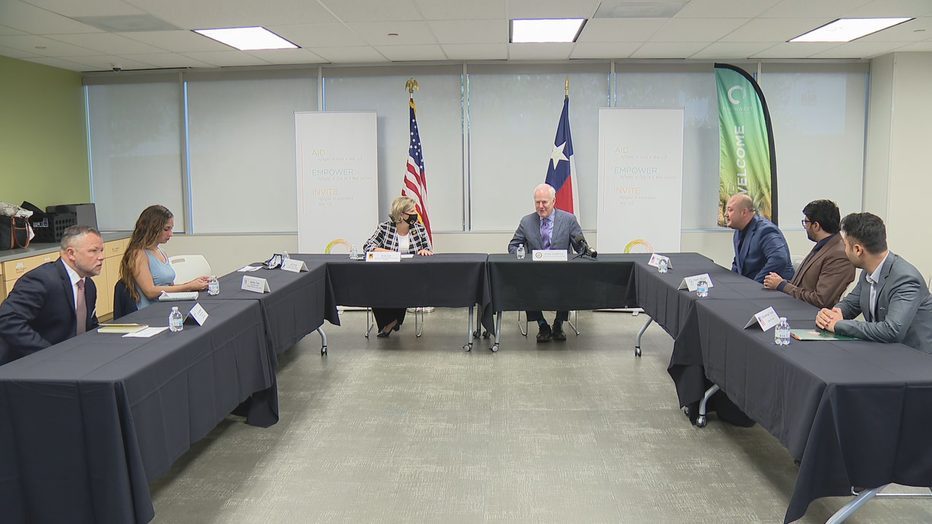Afghan evacuees discuss their resettlement process in Texas with Sen. Cornyn

Afghan evacuees discuss their resettlement process in Texas with Sen. Cornyn
Texas U.S. Senator John Cornyn visited with Afghan immigrants and organizations helping Afghan evacuees to see how the resettlement process is working in Texas following the withdrawal of U.S. troops from Afghanistan in August.
DALLAS - Texas U.S. Senator John Cornyn visited with Afghan immigrants and organizations helping Afghan evacuees to see how the resettlement process is working in Texas following the withdrawal of U.S. troops from Afghanistan in August.
It’s still unclear how many people with special immigration visas remain in Afghanistan.
Sen. Cornyn said the State Department continues to negotiate for their safe evacuation.
"It was chaotic. A single day did not go without suicide bombing, ambush," Afghan immigrant Najeeb Aminyar said.
Aminyar worked as an interpreter and translator for U.S. armed forces in his native Afghanistan starting in 2010, when he was 20 years old.
He said many interpreters like him risked torture and death threats from the Taliban to work with the United States, hoping for a better future.
"It was an opportunity to help my country get organized, have a stable government, and develop. I believed in the U.S. mission in Afghanistan and that’s why I signed up," Aminyar said.
Fazel Bahadri also worked as an interpreter for the U.S. armed forces since he was 16, starting in 2001 shortly after 9/11, only to see the cause he contributed to unravel in a matter of weeks.
"You try to build a house for 20 years, and you do everything for that house, and it collapsed within a matter of 45 days. I was really upset. I was really worried about the people," Bahadri said.
Both men said they and their families faced death threats from the Taliban for working with the U.S., and they were able to come to America on special immigrant visas - or SIVs.
But both also had to leave most of their family behind.
"They’re in a horrible situation, nobody has a job, nobody has security," Bahadri said.
It’s still unclear how many SIV eligible Afghans in need of help are left in the region.
"The State Department is still negotiating for the evacuation of some of these individuals, including people who have permanent legal status in the United States, not just Afghans," Sen. Cornyn said.

Friday, organizations helping Afghan evacuees and SIV holders like Bahadri and Aminyar met with Sen. Cornyn at the Northwest Community Center to advocate for U.S. allies left behind.
"They have fought shoulder by shoulder with American forces, they have provided the accurate information," Bahadri said.
"I do think we have a moral obligation to help them, protect them and their families," Sen. Cornyn said.
So far, more than 560 Afghan evacuees have been resettled in Texas following the evacuation of U.S. troops in Afghanistan.
RELATED: 500-plus Afghan refugees resettled in Texas post-U.S. withdrawal
Sen. Cornyn said the U.S. government is still working to get a handle on how many legitimate SIV holders are left in the country and vetting those coming into the U.S. to make sure they are not a threat to public safety.
"What worries me is we’re trying to clean up the mess from the hasty and chaotic evacuation in August without really knowing what the numbers are, so we can see if we’re making progress or falling behind," Sen. Cornyn said.
Refugee services of Texas said more than 4,000 Afghan immigrants are expected to be resettled in Texas in the coming months, many of them in the DFW area.
They are constantly working to find emergency shelter and supplies for those families.

